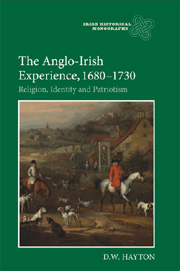Book contents
- Frontmatter
- Contents
- List of Illustrations
- Acknowledgments
- Abbreviations
- Preface
- Note on dates and quotations
- 1 From barbarian to burlesque: the changing stereotype of the Irish
- 2 Anglo-Irish attitudes: shifting perceptions of national identity
- 3 Aristocratic decline: the fall of the house of Ormond
- 4 A presence in the country: the Brodricks and their ‘interest’
- 5 ‘Commonwealthman’, unionist and king's servant: Henry Maxwell and the Whig imperative
- 6 ‘Paltry underlings of state’? The character and aspirations of the ‘Castle’ party, 1715–32
- 7 Creating industrious Protestants: charity schools and the enterprise of religious and social reformation
- 8 A question of upbringing: Thomas Prior, Sir John Rawdon, 3rd Bt, and the mentality and ideology of ‘improvement’
- Bibliography of secondary works
- Index
1 - From barbarian to burlesque: the changing stereotype of the Irish
Published online by Cambridge University Press: 05 February 2013
- Frontmatter
- Contents
- List of Illustrations
- Acknowledgments
- Abbreviations
- Preface
- Note on dates and quotations
- 1 From barbarian to burlesque: the changing stereotype of the Irish
- 2 Anglo-Irish attitudes: shifting perceptions of national identity
- 3 Aristocratic decline: the fall of the house of Ormond
- 4 A presence in the country: the Brodricks and their ‘interest’
- 5 ‘Commonwealthman’, unionist and king's servant: Henry Maxwell and the Whig imperative
- 6 ‘Paltry underlings of state’? The character and aspirations of the ‘Castle’ party, 1715–32
- 7 Creating industrious Protestants: charity schools and the enterprise of religious and social reformation
- 8 A question of upbringing: Thomas Prior, Sir John Rawdon, 3rd Bt, and the mentality and ideology of ‘improvement’
- Bibliography of secondary works
- Index
Summary
The Englishman's offensive practice of creating adverse social stereotypes of supposedly inferior national or racial groups has proved most attractive as a subject for study when it can be depicted as a weapon of colonial or neo-colonial exploitation. This is particularly true in relation to the development of Irish stereotypes, where a moralistic tone often intrudes. With the exception of the work of literary specialists, research into popular English impressions of Ireland and the native Irish has tended to concentrate on the periods in which caricature can be shown to have facilitated the justification of coercive policies and ‘imperialist’ domination. Sixteenth-century characterisation of the ‘wild Irishman’ as a barbarian and near-beast, a Caliban close to home, helped to legitimise the Elizabethan conquest and the rapacity of plantation schemes, just as nineteenth-century cartoons of prognathous and blood-lusting Fenians would vindicate Victorian repression. By contrast, relatively little attention has been paid to the era in between, the late seventeenth and eighteenth centuries, in which the inhabitants of Ireland were generally regarded by the English as figures of fun rather than bogeymen, and ‘Teague-land’ became one of the first resorts of the English humorist. In the century following the Restoration of King Charles II, the stereotypical Irishman – appearing with predictable regularity on the English stage and in print, in plays, novels, mock-epic poems, essays, political tracts, ballads and jest-books – was transformed from a half-human savage into a ridiculous and contemptible gimcrack Englishman, whose limited capacities and comic idiosyncrasies offered cheap laughs and reassurance to the preening superiority of the metropolitan.
- Type
- Chapter
- Information
- The Anglo-Irish Experience, 1680-1730Religion, Identity and Patriotism, pp. 1 - 24Publisher: Boydell & BrewerPrint publication year: 2012



